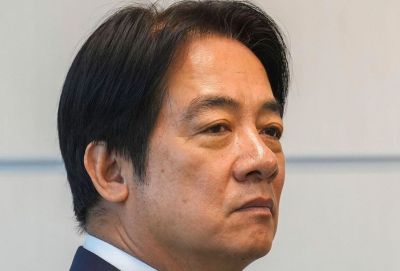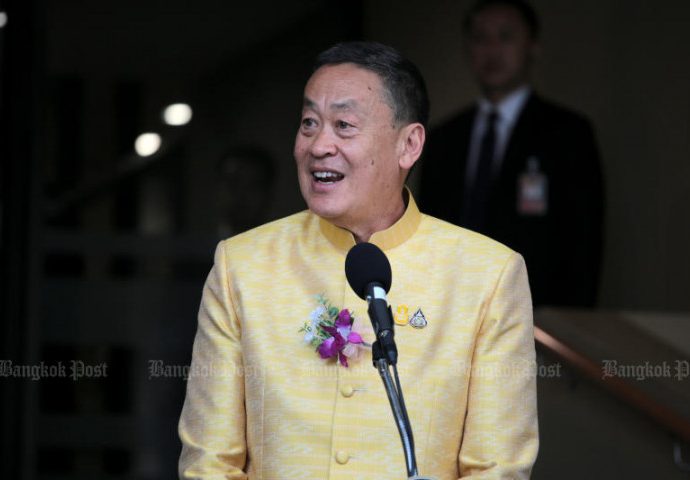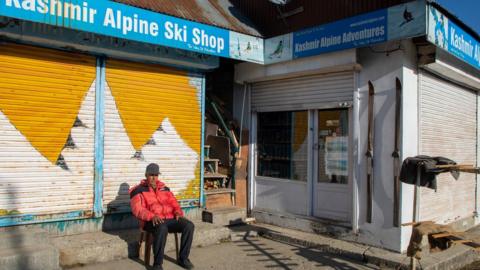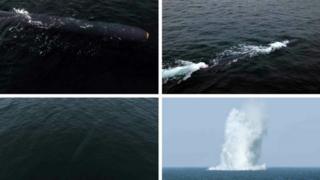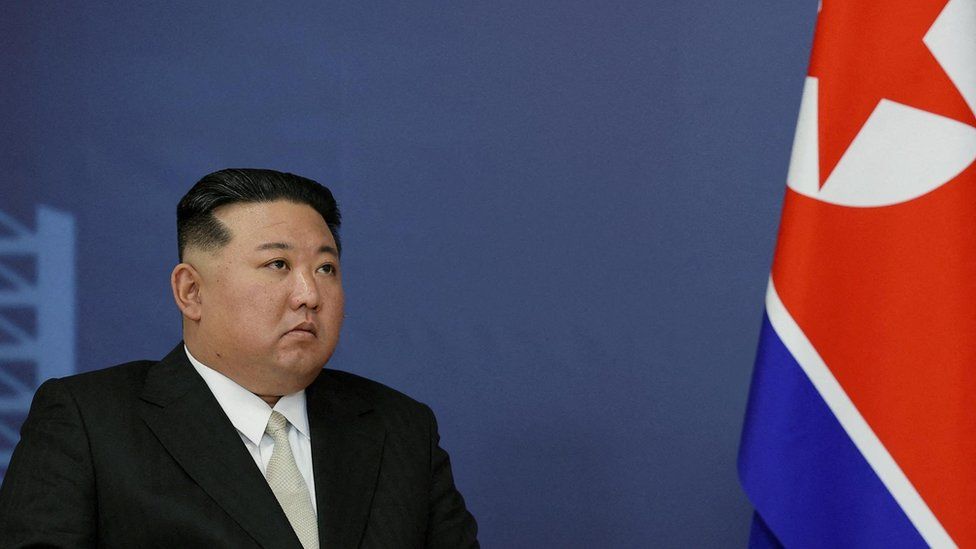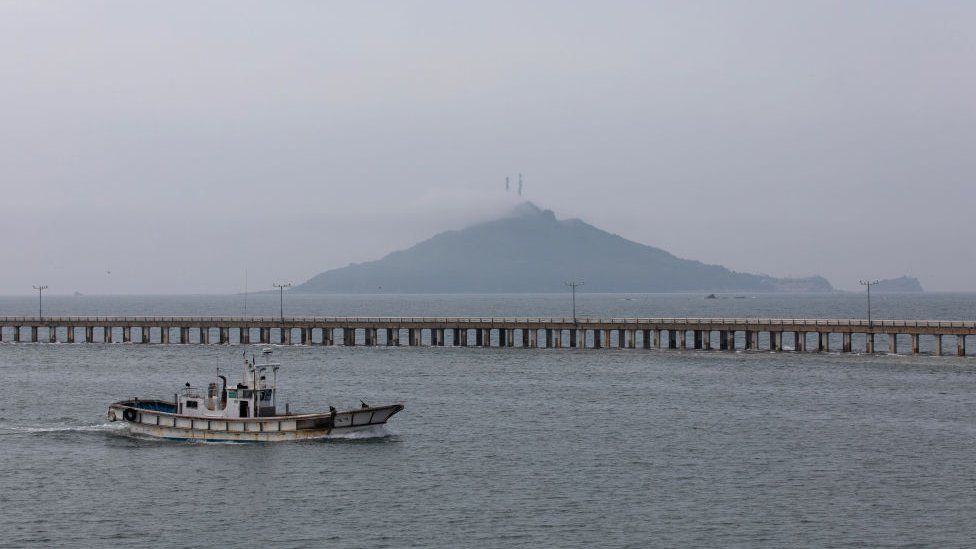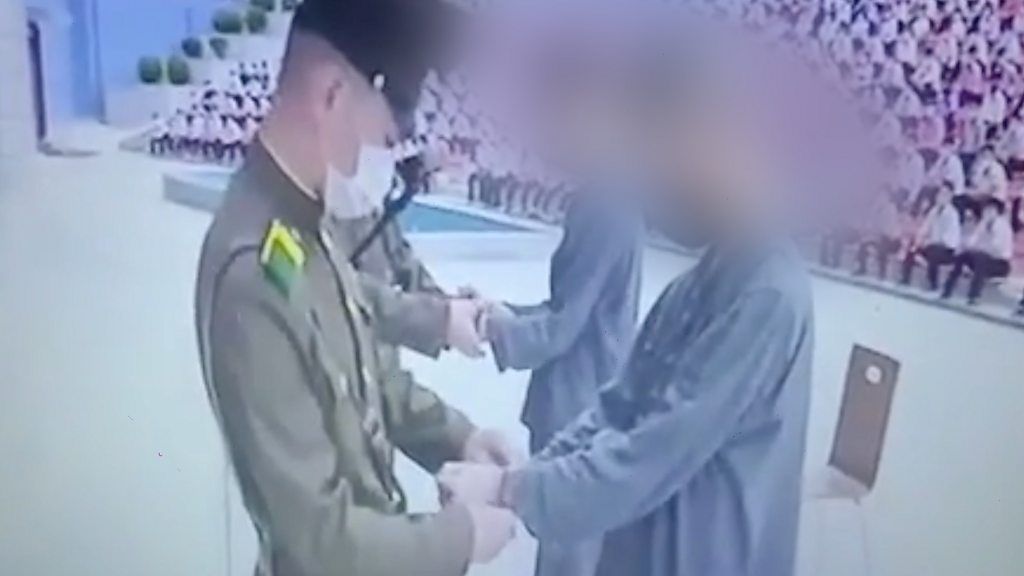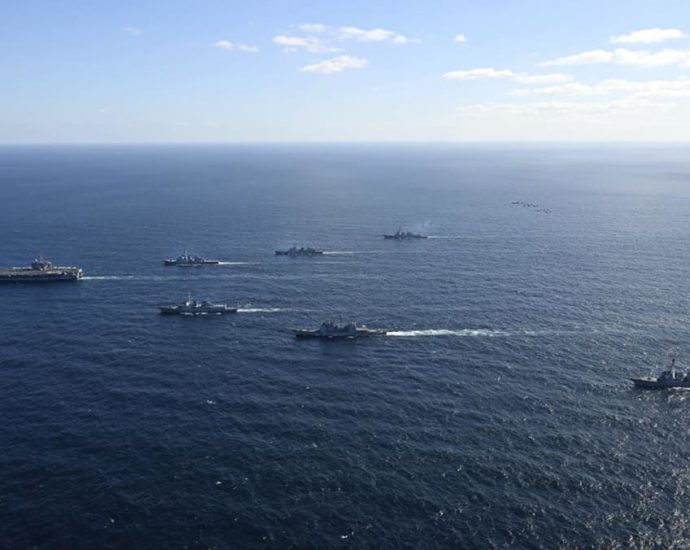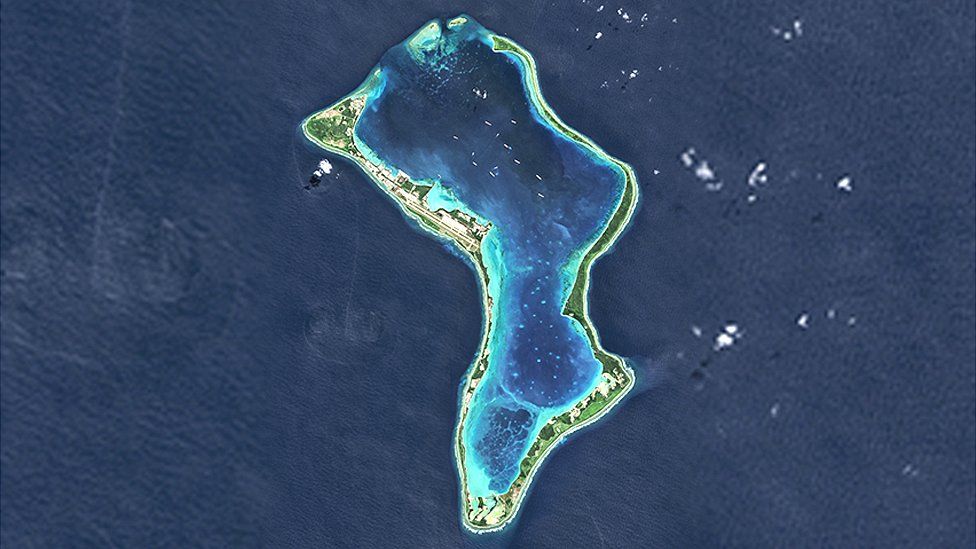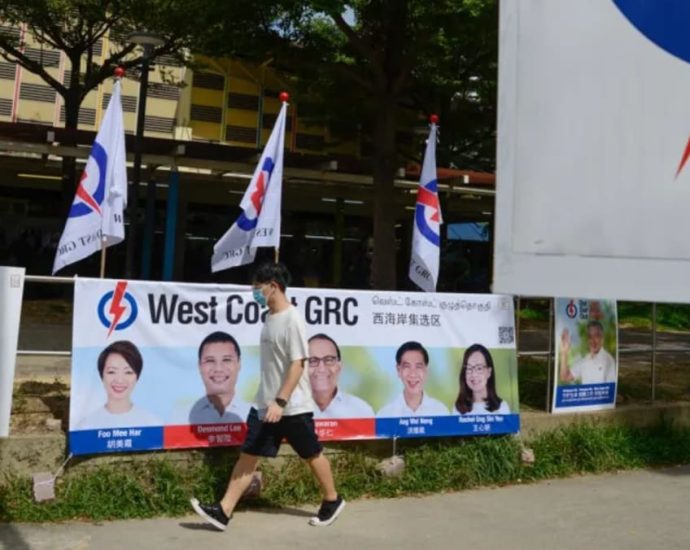Xi’s Taiwan rhetoric backfired at the ballot box – Asia Times
Chinese officials tout “Xi Jinping Thought on Diplomacy” as “epoch-making” and praise the “great insight” of Xi’s “Global Security Initiative.” When it comes to Taiwan, however, Xi appears stuck with a misguided and failing policy as underscored by the results of the island’s January 13 elections.
China’s policy holds that Taiwan must subordinate itself to the Chinese Communist Party (CCP) government in Beijing, handing over control of its foreign relations. Until this happens, the PRC will inflict pain through military pressure, economic coercion and restriction of Taiwan’s international privileges.
In the latest example, Nauru announced on January 15 that it would sever diplomatic relations with Taipei and recognize Beijing. The PRC presumably engineered the switch as a reaction to Taiwan’s voters selecting the presidential candidate least preferred by Beijing.
If it determines that voluntary unification has become impossible, China will go to war to forcibly annex Taiwan. PRC officials continue to say they will implement in Taiwan the same “one country, two systems” principle under which Hong Kong authorities are now imprisoning peaceful protestors, including some who merely stood outside holding blank pieces of paper.
Apparently thinking it would sweeten the deal, China’s ambassador to France said in 2022 that, after unification, China would carry out “re-education” in Taiwan. This “choose me or I’ll kill you” approach had a predictable counterproductive influence on Taiwan’s elections.
There was considerable unhappiness in Taiwan with the relatively anti-China Democratic Progressive Party (DPP). The opposition accused the DPP leadership of corruption and suppression of dissent. Young adults are disillusioned with the government’s failure to make housing more affordable. The supply of electricity has become unreliable because of the DPP’s controversial aversion to nuclear power.
Many Taiwan citizens strongly support the principle that no one political party should monopolize governance, and the DPP has held the presidency for the last eight years.
Despite these headwinds, current Vice President Lai Ching-te, the DPP candidate, won the presidential election, largely on the strength of the DPP’s anti-China stance.

Both the PRC government and Taiwan’s other large political party, the Kuomintang (KMT), argued that voting for Lai and the DPP was tantamount to voting for war. But Lai’s victory indicates this argument did not sufficiently persuade Taiwan’s voters that drawing closer to China would increase their security.
Surveys of public opinion on Taiwan show overwhelming, and increasing, support for two ideas:
- First, most of Taiwan’s people identify as “Taiwanese” rather than “Chinese.” They see themselves as a distinct nationality with a different political culture from that of mainland Chinese.
- Second, they want the status quo of a de facto but not de jure independent Taiwan to continue indefinitely. Beijing exercises no authority over Taiwan, but Taiwan continues to honor the Republic of China constitution, which stipulates links to mainland China.
The KMT proposed seeking peace with China through dialogue, economic integration and affirming that Taiwan is a part of China.
Lai and the DPP maintained that closer economic links with China would endanger Taiwan’s autonomy and put at risk its civil liberties. Instead, they called for economic diversification away from China, more robust military defenses, and closer relationships with the United States and other democracies to protect Taiwan from takeover by the PRC.
The presidential election result suggests Taiwan’s people believe that the political costs of further economic entanglement with China are outweighing the financial benefits. They also appear willing to endure continued cross-Strait tensions as the price of maintaining their identity and freedoms.
These outcomes are the exact opposite of what Beijing wishes its policy would achieve.
Framing the issue
The foundation of policy-making is rhetorical construction – how political elites frame an issue. Inevitably, any framing includes certain assumptions.
Erroneous assumptions lead to bad policy. There are many historical examples.
Japan wrongly assumed in 1941 that America was such a decadent and flaccid society that a sudden and successful strike against US military power in the Pacific would cause Washington to accede to a Japanese sphere of influence in the Asia-Pacific region.
Instead, the US immediately committed itself to fighting a war to roll back the Japanese empire and uproot Japan’s government and political system.
During the Cold War, the US military attempted to prevent the Vietminh from taking over South Vietnam based on fears that a shared communist ideology would make Vietnam a puppet of China and that the communization of Vietnam would lead to the same result in Thailand and Japan.
Today, however, Thailand and Japan remain US allies, and the ruling Communist Party of Vietnam government seeks US assistance to resist Chinese domination.
China’s current policy toward Taiwan is based on three questionable assumptions.
First, Xi has specifically said the “great rejuvenation of the Chinese nation,” defined as Chinese achieving a high material standard of living and acquiring sufficient military power to protect the country from molestation by foreigners (the old idea of “rich country, strong army”), cannot be complete without China’s “reunification” with Taiwan.
This is untrue. Taiwan’s being de facto independent has not prevented the standard of living of mainland Chinese from rising dramatically in recent decades. Nor has an autonomous Taiwan interfered with the PRC bulking up militarily to the point where no country wants to fight China. The argument works only as a syllogism: not controlling Taiwan is a threat to China’s security if Taiwan is defined as Chinese territory.
In a second flawed assumption, Xi and other PRC officials say the problem is not “Taiwan compatriots,” but rather “outside forces and the few separatists.” Blaming foreign agitation for political unrest is a common theme in official PRC commentaries about Xinjiang and Hong Kong, and Beijing applies it to Taiwan, also.
But this narrative seems willfully ignorant of the public opinion surveys in Taiwan indicating that strong and rising majorities do not self-identify as “Chinese” and never want Taiwan to politically unify with China.
Finally, the official PRC position, summarized in a 2022 Chinese government white paper, asserts as an “indisputable fact” that “Taiwan has belonged to China since ancient times.” This “fact,” however, is quite disputable.

Taiwan’s indigenous inhabitants are not ethnically Chinese. In pre-modern times, Chinese governments saw Taiwan as barbarian territory and as a haven for pirates and political dissidents. The rulers in Beijing wished Taiwan didn’t exist. Spain and Holland controlled parts of the island in the 1600s. China’s Qing Dynasty government annexed Taiwan in 1684 mainly to prevent its use as a rebel base.
Taiwan was a Japanese colony for the 50 years prior to the end of World War II. Mao Zedong himself supported independence for Taiwan while it was under Japanese occupation, changing his position only after the rival KMT government claimed sovereignty over Taiwan during the 1943 Cairo Conference.
With the KMT’s defeat in the Chinese Civil War and expulsion from the mainland, Taiwan became the seat of the Republic of China government. The CCP regime has never ruled Taiwan.
The most objectionable part of Beijing’s claim to sovereignty over Taiwan is that it disregards the principle of self-determination. The vast majority of Taiwan’s people don’t want to be PRC subjects. Asserting a right to seize a country against the will of its inhabitants seems an anachronism in the 21st century.

Xi inherited what has become a disastrous rhetorical framework – not only misconceived but continuously and widely reiterated through the Chinese education system and media. Today it entraps the CCP leaders.
They have, in effect, proclaimed that they are not worthy to rule if they “lose” Taiwan. According to a Taiwan media report, when Xi met with KMT leader Hung Hsiu-chu in 2016, he expressed the fear that “the Communist Party would be overthrown by the people” if his government failed to stop Taiwan from becoming formally independent.
The PRC’s current approach to Taiwan not only deepens the conviction of Taiwan’s people that they never wish to be ruled from Beijing; it also potentially obligates Chinese leaders to start a war even if they do not believe they can win.
As formidable as the Chinese armed forces have become in recent years, it is far from certain the PRC would win a cross-Strait war against probable US and very likely Japanese intervention.
Credible simulations run by the Center for Strategic and International Studies in Washington in 2022 found that both US and Chinese forces would suffer heavy losses; China would devastate – but fail to conquer – Taiwan; and the CCP would be in danger of ouster at home.
How to escape the trap
Both inside China and externally, the PRC leadership could and should begin to dismantle its rhetorical construct of the China-Taiwan relationship.
If it should wish to do so, the Chinese government could aim for something akin to the relationships between other pairs of states with large communities that share culture and ethnicity, such as the United States and Canada, Australia and New Zealand or China and Singapore.
Substantively, a new narrative could discontinue China’s claim to owning Taiwan. Instead, it could emphasize points such as these:
- China recognizes that current political and legal arrangements are the result of historical events and will take a long time to settle.
- Regardless of these circumstances, much of the population of Taiwan is unalterably “Chinese” by way of ancestry and culture.
- China therefore supports and celebrates Taiwan’s successes as Chinese civilizational success.
- China welcomes additional cooperation with Taiwan, and confidently looks forward to demonstrating to Taiwan the benefits of closer integration.
This would flip the game to China’s advantage, with positive spillover effects in China’s relationships with the US and other countries.
Alas, Xi seems either unwilling or unable to escape from the trap his party manufactured.
Reports in early 2023 said Xi had assigned CCP ideologue Wang Huning to formulate a new principle for China’s Taiwan policy to replace “one country, two systems.” A year later, Beijing has not announced even a superficial change in a Taiwan policy that serves the PRC so badly.
Denny Roy is a senior fellow at the East-West Center, Honolulu.
Jail, caning for man who tried to rape drunk friend after night out, molested her on the way to his home
SINGAPORE: A 39-year-old man who attempted to rape his intoxicated friend, 29, at his home after a night out with friends was handed four years and six months’ jail and three strokes of the cane on Thursday (Jan 18). He also molested the victim in a taxi on the wayContinue Reading
Srettha says handout scheme may be delayed
Digital wallet is worthwhile and there won’t be any corruption, insists PM
PUBLISHED : 19 Jan 2024 at 11:40

Prime Minister Srettha Thavisin said on Friday that his coalition government would move ahead with its flagship 500-billion-baht digital wallet handout scheme, though it may be delayed yet again.
Mr Srettha, who has been touting the policy as a stimulus measure necessary to revive the sluggish economy, did not specify a launch date. Earlier this week, Deputy Finance Minister Julapun Amornvivat said it would be delayed beyond May.
The programme, originally slated for February, has been beset by concerns over how it will be funded, with some experts calling it fiscally irresponsible.
The government has insisted the scheme, which would transfer 10,000 baht each to 50 million Thais via a mobile application to spend in their local communities, would be managed carefully through cascaded borrowing.
Mr Srettha, who is also the finance minister, said on Friday the government has data to prove the project is worth carrying out and that there would be no corruption.
He was speaking to reporters after a trip to Davos, Switzerland, where he spoke at the World Economic Forum (WEF).
New government office launched to serve as âfirst stopâ for Singaporeans to share ideas, seek support for ground-up initiatives

In a separate press release, SGPO said it will serve as a “first stop” for individuals and interest groups keen to partner the government.
It will curate key government resources for partnership, funding and volunteering opportunities. It will also drive the adoption of new engagement processes.
Encouraging interested Singaporeans to come forward, Mr Wong said the government wants to create ample opportunities for everyone to contribute meaningfully to a shared future.
As a result of government-people partnerships, there is a strong sense of cohesion and solidarity in Singapore, he noted, adding that the country cannot afford to rest on its laurels.
In a world of conflict and confrontation, Singapore will face an external environment that is less favourable to the country’s security and prosperity, said Mr Wong, who is also Finance Minister.
He added that in the face of economic and social strain, people’s trust in the system gets eroded, and differences become entrenched, resulting in divided and polarised societies.
“We are not immune to these same powerful forces that can potentially divide us, there’s no reason why Singapore is immune to this … In fact, as a diverse, multi-ethnic, multi-religious society, we are all the more susceptible to such divisive forces in the world,” he continued.
Adding that this is why he launched the Forward Singapore exercise, Mr Wong noted that volunteers and community groups often know what the local community needs best, and can quickly organise themselves to address emerging gaps.
“And there are many groups, ground-up initiatives and others, who can evolve new and innovative ways to serve the community, and to shape the character and tone of our society,” he said.
“The bottom line is that we can achieve much more when we work together as partners.”
Kashmir’s rare snowless winter sets off alarm bells
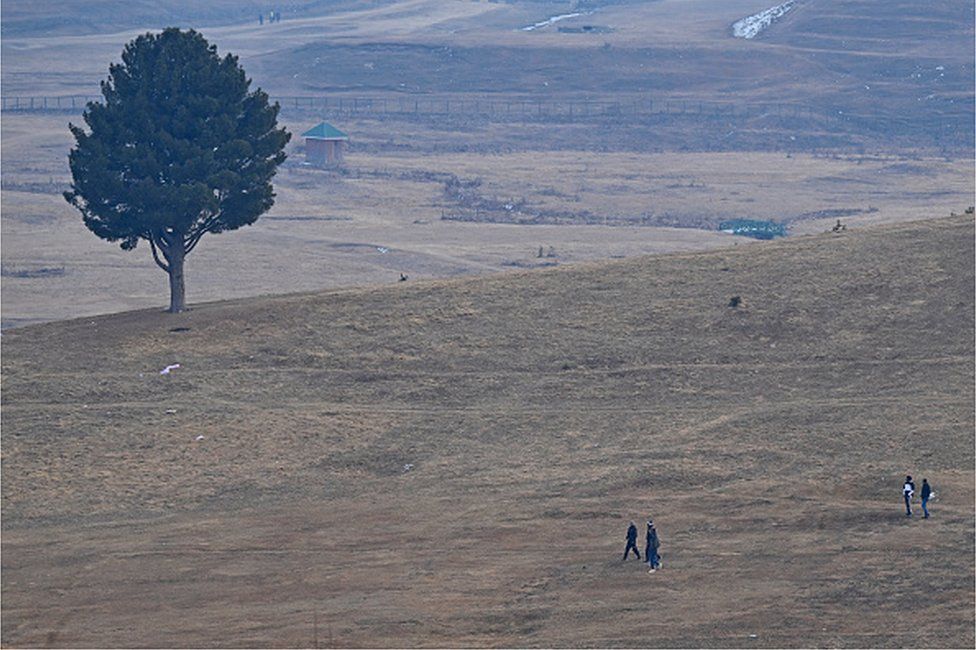 AFP
AFPIn his 17 years of managing a hotel in Gulmarg, a picturesque town in Indian-administered Kashmir, Manzoor Ahmad has never seen a season without snow.
But this year, things are different: the snow-clad mountains in the region are oddly brown and barren.
“This is unprecedented,” Mr Ahmad, 50, says, and adds that tourists have stopped making reservations at his hotel.
Every year, thousands of tourists visit Kashmir in winter to enjoy skiing and sightseeing. But the absence of snowfall this year has bought the region’s tourism industry to its knees.
Close to 100,000 tourists visited Kashmir last January, but this year that number has reduced by more than half, officials say.
Experts say the snowless winter will have a disastrous impact on the territory’s economy as the tourism sector accounts for about 7% of Jammu and Kashmir’s GDP. It will also impact farming and water supply as scanty snowfall will not replenish groundwater reserves adequately.
Environmentalists say that climate change has been impacting the region, causing extreme weather events and prolonged dry spells in both winter and summer. Jammu and Kashmir’s weather department recorded a 79% rainfall deficit in December and a 100% deficit in January.
The valley is also experiencing warmer weather, with most stations in Kashmir recording a 6-8C (43-48F) rise in temperature this winter.
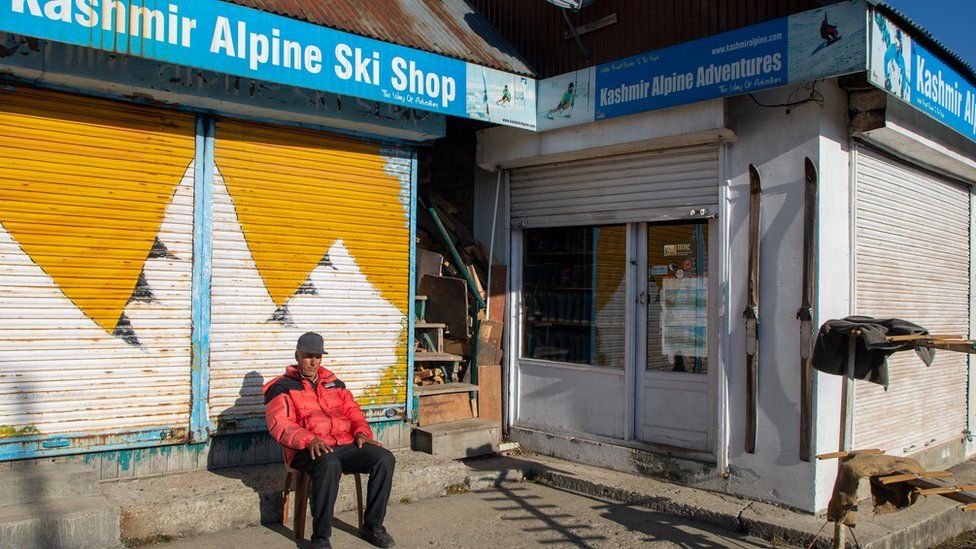
Hotel owners say tourists have cancelled their reservations, while many left after visiting the place as they were unable to enjoy skiing or sleigh rides.
“Over 40% of hotel reservations have been cancelled and new bookings are currently on hold,” Aqib Chaya, president of Gulmarg Hoteliers Club, says.
Raj Kumar, a resident of the western state of Maharashtra who visited Kashmir with his family for the first time, says that they were crestfallen.
“We came here to witness snowfall and go on a cable car ride…but we were disappointed to see a snowless Gulmarg,” he says.
The decline in tourists is hurting local businesses, a majority of which rely on tourism in the winter months to survive.
Tariq Ahmad Lone, who heads the pony riders association in Gulmarg which has about 5000 members, says that they have not been able to earn much in the last three months. Pony rides are an enjoyable way to travel through the region’s highlands and hence, a popular tourist activity.
“Our livelihood directly depends upon snow. A snowless season will bring miseries for our families,” he says. He adds that since most of the riders have been engaged in this profession for decades, it’s almost impossible for them to find another source of livelihood.
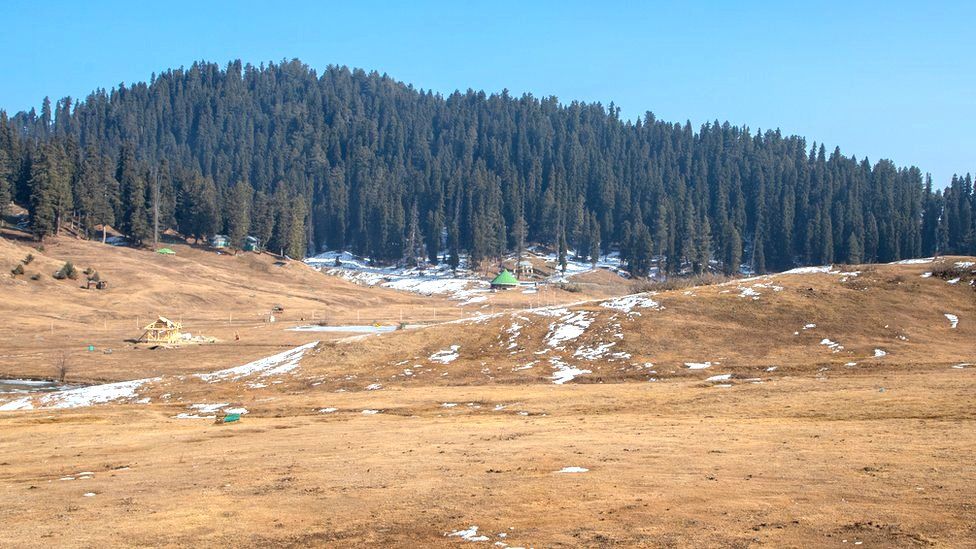
Showkat Ahmad Rather, who heads the Ski Association of Gulmarg, echoes this sentiment.
“I have been working as a ski instructor for the past 27 years, I can’t switch to doing something else,” he says.
Apart from tourism, experts say that the absence of snowfall will also impact generation of hydroelectricity, fisheries and farming.
The neighbouring territory of Ladakh – another popular tourist destination – is also experiencing a snowless winter.
“The farming here is dependent on glaciers. The glaciers are melting at a fast rate. No snowfall in the peak [winter] season means early that spring water will be a big problem,” environmentalist Sonam Wangchuk says.
“This is one of the driest spells in the Himalayan region,” Sonam Lotus, director of the Meteorological Centre in Leh, says. Irfan Rashid, an assistant professor at University of Kashmir, adds that a drought like situation “can’t be ruled out”.
The region normally receives heavy snowfall during peak winter – a 40-day period that lasts from 21 December to 29 January. During this time, mountains and glaciers get covered with snow and this ensures water supply throughout the year.

Some experts say that snowfall in the region has been declining for the past couple of years.
“Before the 1990s, we would witness heavy snowfall of up to 3ft (0.9m) and it wouldn’t melt until spring. But we are now witnessing warm winters,” Shakil Ahmad Romshoo, an earth scientist, says.
He is among those who believe that the Kashmir valley is facing the “brunt” of climate change.
“Our per capita greenhouse gas emissions are very less compared to other states. People in Kashmir have a very modest lifestyle. We are the victims of global climate change.”
According to a study by Mr Romshoo and his team, the region, including Ladakh, could heat up to “catastrophic levels” by the end of the century – it could witness a rise in temperature by 3.98-6.93C.
Meanwhile, the people of Jammu and Kashmir continue to hope for a miracle this winter.
The weather department hasn’t predicted a spell of heavy snowfall until 24 January, but Mr Ahmad says that he’s hopeful that nature will be “kind” to them.
BBC News India is now on YouTube. Click here to subscribe and watch our documentaries, explainers and features.

Read more India stories from the BBC:

N Korea conducts ‘underwater nuclear weapons system’ test – state media
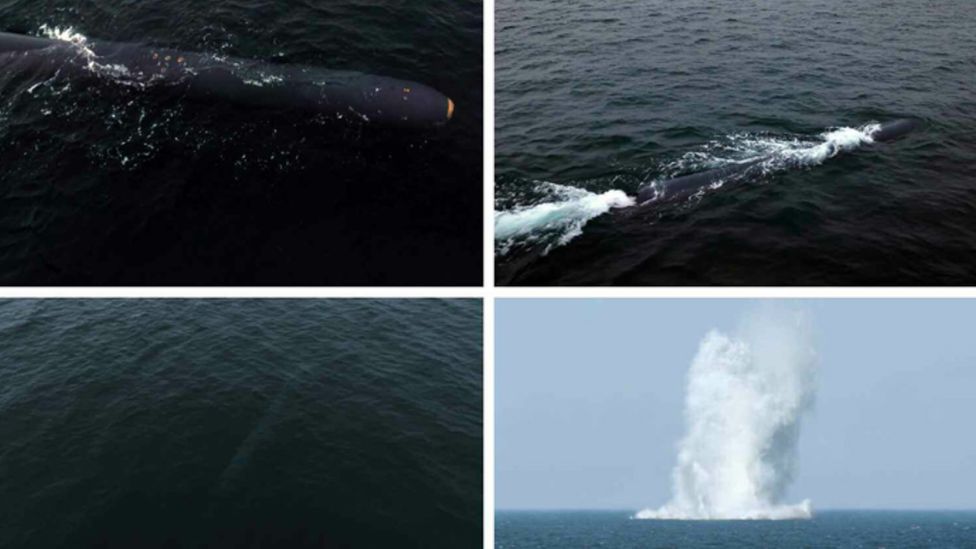 RODONG SHINMUN
RODONG SHINMUNNorth Korea says it has tested an “underwater nuclear weapons system” in response to joint military drills by the US, South Korea and Japan, according to state media reports.
The test of the “Haeil-5-23”, a name North Korea has given to its nuclear-capable underwater attack drones, took place in waters off its east coast.
The North has carried out similar tests previously.
But the latest comes amid a noted escalation in the North’s rhetoric.
It has repeatedly stated that is is building up its military arsenal in preparation for war that could “break out at any time” on the peninsula.
Its leader Kim Jong Un this week declared that the goal of re-unification was over and designated the South as the “principle enemy”.
His statements have also followed several claimed advances in his country’s military and nuclear capabilities – including in its underwater operations.
Last September, the North revealed what it claimed was its first submarine capable of launching nuclear weapons.
Since March 2023, it has also claimed tests of its Haeil system – underwater unmanned nuclear-armed drones.
Little is known about these weapons or their claimed performance but analysts say they are a less significant weapon than the North’s nuclear ballistic missiles.
The North last year conducted several tests of its long-range missiles.
Last year it also said it had put a spy satellite in space and has pledged to put more there this year.
On Friday, its defence ministry said it had tested the underwater system to “deter the hostile military manoeuvres of the navies of the U.S. and its allies”, according to KCNA’s report.
Washington, Seoul and Tokyo carried out joint three-day drills involving a US aircraft carrier in the waters around the Korean peninsula earlier this week.
Related Topics
-
-
31 December 2023
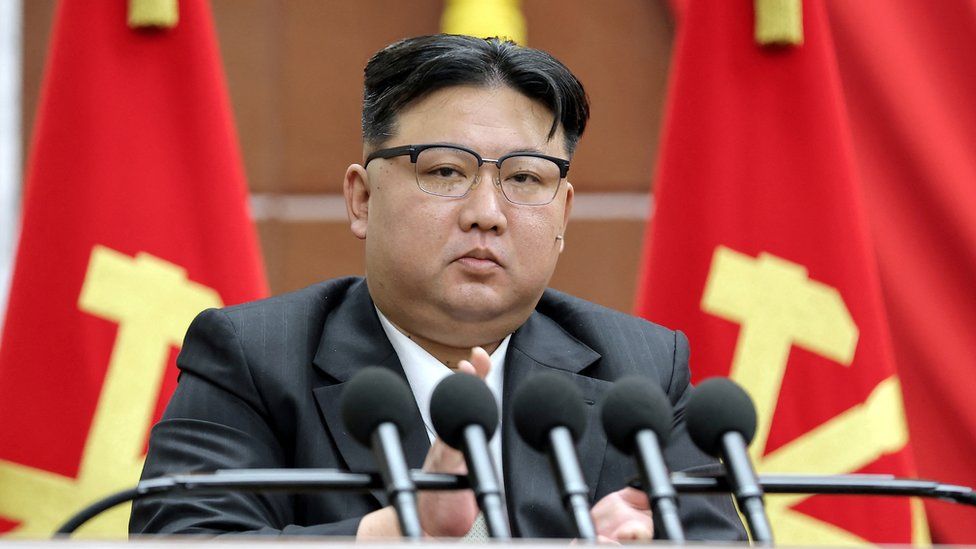
-
North Korea conducts test of underwater nuclear weapons system: Report
SEOUL: North Korea has conducted a test of its underwater nuclear weapons system in a protest against this week’s joint military drills by South Korea, the United States and Japan, state media KCNA said on Friday (Jan 19). The test of the Haeil-5-23 system, a name North Korea has givenContinue Reading
The three layers of Natural Law – Asia Times
Former US president Donald Trump has been accused by his opponents of acting, during his time in office, as if he had “immunity” from certain laws and rules that would limit his actions if he did not have, at the relevant time, the unique status of POTUS.
President Xi Jinping was criticized for his conjectured role in the ejection of a former president Hu Jintao from the 20th annual meeting of China’s ruling party on October 22, 2022. Critics were not silenced even though Hu’s son, Hu Haifeng, has been named to a top job (deputy minister) high up in China’s current government.
In February 2022 Canada’s prime minister, Justin Trudeau, was charged with being behind an order sent to protesting truck drivers threatening to “put into protective custody” (Trudeau’s critics said the dogs were to be killed) the pets of the truckers.
Winston Churchill ordered the fire-bombing of Dresden (February 1945) “in retaliation” for Germany’s Blitz of Coventry (November 1940).
Cato the Elder, leader of the Republic, said “Carthage must be destroyed” at the end of every speech he made while in the Roman Senate.
Are the political rules and morals that bind “Princes” different from those that apply to the rest of us?
“A Prince who wants to keep his authority must learn how not to be good.” – Machiavelli
Are there any limits to the powers legitimately (or at least inevitably) may be exercised by Princes?
Chairman Mao Zedong’s back-yard steel mills burned up many farm implements that would have been far better kept applied to their intended use.
Josef Stalin’s forced farm collectivization (partly in today’s “breadbasket Ukraine”) caused mass starvation.
“The King can do no wrong.” – Henry de Bracton prior to 1268
We may not ignore the balancing adage: “Madness in great ones must not unwatched go” (Shakespeare).
The last two historical cases are over the line, in my opinion at least.
But how do we find the line: What is the standard, what is the “rule of law” that applies?
“The Heavens are high, and the Emperor is far away.” – traditional Chinese
For the purposes of this essay, I read that to say the Gods and the Emperor are good in ways we don’t understand; or maybe the higher-ups are good, but their local representatives are not.
Parsing Natural Law
I suggest all nations should respect an admittedly smudged and blurry line, albeit one with a long and dignified provenance: Natural Law.
I say there are three layers of law that can be found in (within reason) all places and all civilized times. (I accept the exception of small communities profoundly endangered such as that of the Donner Party survivors, whose resort to cannibalism – presumably at the behest of their leaders – was necessary.)
The first two layers of law are familiar: The lowest is law emanating from the legislature and executive administration. It is malleable, even to the point of being easily altered and subject to regular revision. It is interpreted by ordinary judges and administered by the executive.
The second layer is constitutional and relatively unchanging, albeit capable of amendment. First-layer laws, executive acts and usurpations of natural rights that are inconsistent with constitutional principles are ruled to be illegitimate by the special judges who interpret constitutional law. These are familiar, traditional ways of describing a rule of law.
The third layer has always been there, but it came into the bright light of actual, practical enforcement after World War II.
At the “war crimes” trials it was held that, for example, even if a national constitution or a supreme leader said it was OK to remove certain persons or despised nationals from the protection of the law, and kill them, Natural Law, even if unwritten, disallowed it, and persons who broke Natural Law, no matter how high and mighty they may have been in their life under their bad laws, could be punished even with death, for their transgressions of Natural Law.
(Although that phrase, “Natural Law,” was not used during the postwar prosecutions, it was there enforced.)
What are the current implications of this essay for China and America?
No one in either nation is going to be charged with breaking Natural Law.
Trump has been twice charged (impeached) but not convicted of committing constitutional infractions of “ordinary” two-layer law. Chinese officials (especially during and for a time after 2012) have been charged and some punished under a version of two-layer law deemed “corruption.” Their “trials” were consistent with the “Heaven is high …” adage quoted above, that is, Heaven and the Emperor are OK, but local officials not so.
International critics of both nations often find fault with them, but compared with the time just before and during World War II, today’s two most powerful nations are not going to be effectively charged with crimes against Natural Law: and that condition may be counted as progress.
But there are current leaders of lesser nations – I will not name my list here, and readers will have their own “charge sheet” of names – who unfortunately qualify for at least impeachment if not eventual conviction, of great wrongdoing, malfeasance and worse.
But that dreadful reality may provide a welcome opportunity for the two leading nations, as a consequence of their recognition of this “chance to do good and at the same time do well” if they take up the courage and show the will to act in quiet, back-channel, “correct” coordinated ways (in the language of Wang Li) to enforce some forms of international Natural Law.
How can it be done in ways consistent with national interest?
China and America are natural trading partners. That’s not theory. The past 20 years of reality have proved it. By widening the circle of mutual multination trade, letting in the good guys and keeping out the bad guys, and forgetting the petty trade spats the two have been indulging themselves with these past few years, a strategy for growth and profit can be made to serve a greater purpose as well.
Pre-modern students of ethics said that wealth-seeking, profit-making activities were incompatible with “the good.” They were wrong. Pre-modern leaders believed force was the best instrument able to sustain beneficent power. They were wrong too.
The enlightenment ethic allows neighbors to know cooperation among civil partners allows the group to simultaneously police outlaws and earn mutual benefits for those who play fair.
Tom Velk is a libertarian-leaning American economist who writes and lives in Montreal, Canada. He has served as visiting professor at the Board of Governors of the US Federal Reserve system, at the US Congress and as the chairman of the North American Studies program at McGill University and a professor in that university’s Economics Department.
Diego Garcia: UN says UK military island not suitable for stranded migrants
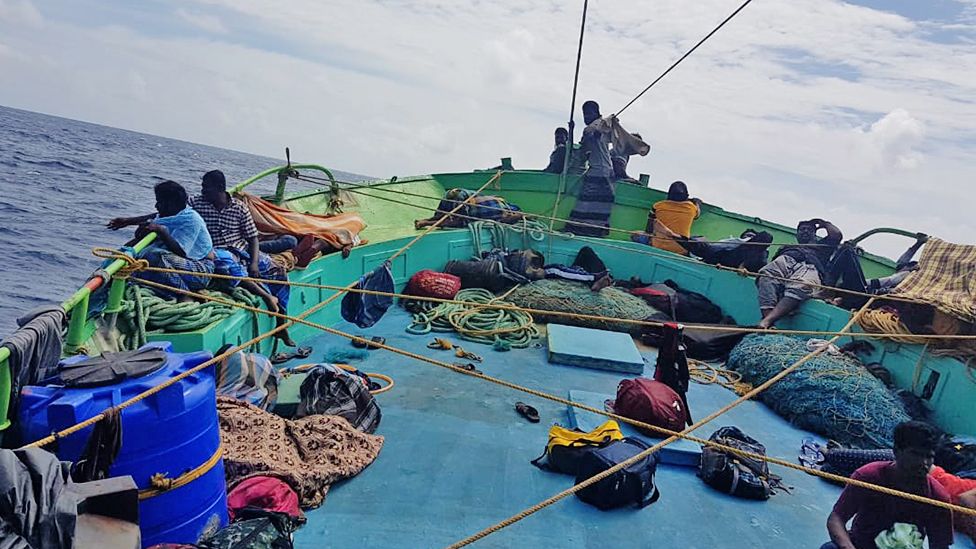 HANDOUT
HANDOUTThe United Nations refugee agency has said a remote British territory in the Indian Ocean, which hosts a secretive UK-US military base, is “not a suitable location” for migrants to be held long-term, after being granted rare access.
Dozens of Sri Lankan Tamils have been stranded for more than two years in a makeshift camp on Diego Garcia.
It is the first time asylum claims have been filed in the territory.
The UK government said it was looking for a “long-term solution”.
“The wellbeing and safety of migrants is the… top priority” of the British Indian Ocean Territory administration, a spokesperson added. British Indian Ocean Territory (Biot) is the islands’ official name.
UNHCR representatives visited Diego Garcia towards the end of 2023 in a trip facilitated by UK authorities. It was the first time they had been given access to the island since the migrants’ arrival more than two years ago.
The UN agency said it was “following up” with officials about what it had found.
“Diego Garcia is an island hosting a military base with virtually no civilian population, and is not a suitable location for long-term residence for this group,” a spokesperson said in a brief statement to the BBC.
“We continue to call on the UK to ensure fair and efficient determination of the pending claims, and to secure solutions for those found to be in need of international protection, in line with international law.”
The first group of Tamils landed on Diego Garcia in October 2021 after their boat ran into trouble while trying to sail to Canada, according to migrants and officials.
The island is located hundreds of miles from any other population, and unauthorised visitors are forbidden.
The group’s subsequent asylum claims were the first ever to be launched on Biot – an area described as being “constitutionally distinct and separate from the UK”, and where court papers say the Refugee Convention does not apply.
Many of the group claim to have links with the former Tamil Tiger rebels in Sri Lanka, who were defeated in the civil war that ended in 2009, and say they have faced persecution as a result.
Hunger strikes
Asylum seekers have described conditions on the island as hellish, but the territory’s unusual legal status has left them in limbo.
There have been multiple suicide attempts and instances of self-harm. There have also been hunger strikes, which lawyers say have involved children.
“We are living a lifeless life. I feel like I am living like a dead man,” one man told the BBC last year.
Lawyers representing asylum seekers on Diego Garcia say about 60 people remain on the island. Several people have been relocated to Rwanda for treatment following suicide attempts.
The BBC understands this arrangement is separate to the government’s plan to send some asylum seekers to the east African country, which passed a significant milestone in Parliament this week..
“Our clients have been in limbo on Diego Garcia for over two years and have still not had their claims for international protection lawfully determined,” one of the group’s lawyers, Tessa Gregory, said.
“The conditions they are having to endure… are dire and entirely unsuitable for a group which includes children and survivors of torture and sexual violence.”
Ms Gregory added that UK lawyers representing the migrants were seeking access to the island.
So far, five people have had their claims for international protection approved, but no country has yet been identified to relocate them to.
The spokesperson said the government was “working with third countries to accept any who cannot be safely returned to their country of origin”.
The government has previously told the BBC that “all allegations of mistreatment are taken seriously and fully investigated”.

Sign up for our morning newsletter and get BBC News in your inbox.

Related Topics
-
-
26 October 2023

-
Analysis: Iswaran case unlikely to delay PAP leadership handover or GE, but contest for West Coast GRC will heat up
SINGAPORE: The charging of former Transport Minister S Iswaran will likely have little impact on the plans for the People’s Action Party (PAP) leadership handover and the next General Election (GE), political analysts said. This is because Prime Minister Lee Hsien Loong would likely have factored in the possibility of the case going toContinue Reading

